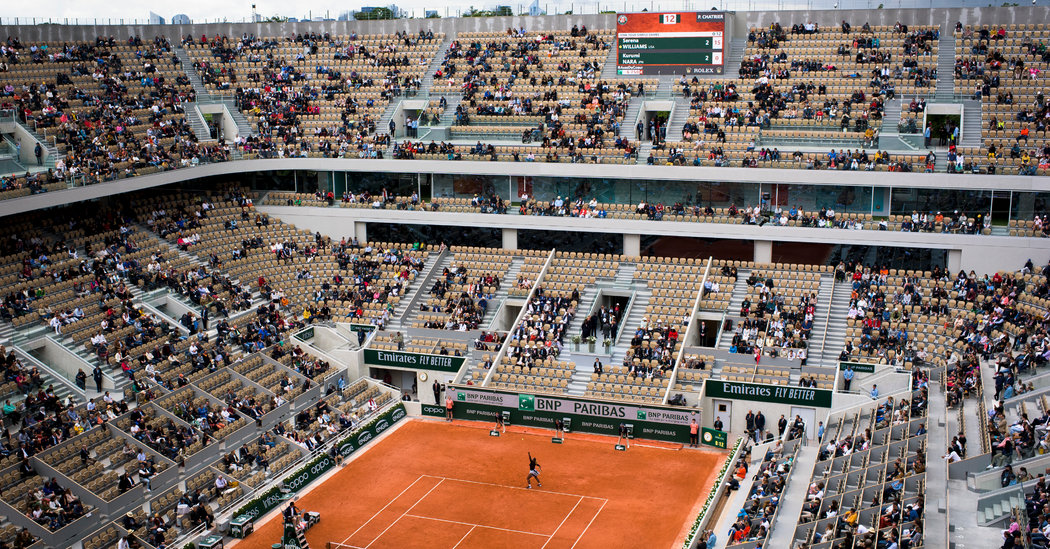
The French Open Is Postponed, to the Surprise of the Tours
The French Open, one of the four Grand Slam tournaments that define success in tennis, will be postponed until September because of the coronavirus.
French Open organizers announced the decision on Tuesday amid a wide lockdown in France aimed at limiting the spread of the virus.
The tournament, the premier clay-court event in the world, was scheduled for May 24 to June 7. Tournament organizers said they shifted those dates to Sept. 20 to Oct. 4.
“The current confinement measures have made it impossible for us to continue with the dates as originally planned,” tournament officials said in a statement.
The change puts the French Open after the United States Open, which had been the last Grand Slam tournament scheduled for 2020.
“We are acting responsibly and must work together in the fight to ensure everybody’s health and safety,” Bernard Giudicelli, the president of the French Tennis Federation, said in a statement.
The decision immediately drew criticism within tennis for being made without consulting others in the game. The date change created conflicts with other events, including the Laver Cup men’s team event headlined by Roger Federer that is scheduled for Sept. 25 to 27 in Boston, and a women’s tournament in Wuhan, China, the city at the center of the global pandemic.
“Excusez moi???” Naomi Osaka, the Japanese star and two-time Grand Slam singles champion, wrote on Twitter.
Steve Simon, the chief executive of the women’s tour, confirmed in a message that the WTA had been caught by surprise by the French Open’s move. Vasek Pospisil, a member of the ATP player council who has been pushing for more player solidarity and influence, said the decision had “come literally out of the blue” for the ATP.
“That’s insane,” Pospisil said in a telephone interview. “These are really rough times, unprecedented times, and this just goes against the whole idea of the tour working together. We have a calendar. We have discussions and negotiations between the Grand Slams and the ATP. We are always trying to make it work for everybody, and they just haven’t consulted the ATP, the players or the other tournaments. It’s just a very selfish move. They are basically doing a power play right now, and it’s quite arrogant.”
French Open organizers did not respond to Pospisil’s comments directly. But the tournament organizers were clearly intent on preserving this year’s edition of their tournament after investing heavily in expansion and renovation in the last several years. The tournament is funding the vast majority of that work without public funds.
“What was important for us was that the tournament continue,” Giudicelli said in a news conference on Tuesday in Paris. “We would not have accepted that clay-court tennis be swept off the international schedule.”
He said the conditions in late September would still be acceptable for playing outdoors. “The temperatures are agreeable,” he said. “We think sincerely that it can make for a fine event.”
This is to be the first year of use for the new retractable roof over the main court, which will allow for night sessions and for play during rain.
But construction at Roland Garros Stadium, the tournament site, has been stopped because of the coronavirus restrictions imposed by the French government. It would have been difficult for the tournament to complete the work in time for the event to begin as originally scheduled.
“There’s a whole organization before these tournaments that people can’t really imagine,” Caroline Garcia, one of France’s top women’s players, said in an interview with the French sports publication L’Équipe. “And it’s impossible today to prepare a tournament of this level, of this quality.”
Initially, there was discussion about shifting the French Open to late July or early August, if the Tokyo Olympics were postponed. Then on Tuesday, the International Olympic Committee reiterated its support for staging the Games as scheduled, from July 24 to Aug. 9, with the Olympic tennis competition to run from July 25 to Aug. 2.
That left the French Open with few options for rescheduling and with concerns that some other delayed event might try to move into the late September slot. Giudicelli and his team chose to impose their will, announcing their decision publicly during a private conference call with ATP and WTA leadership without asking for a green light from the tours or the other three Grand Slam events. It remains unclear whether all leading players will support the move. The ATP player council scheduled a conference call for Wednesday to discuss its response.
Giudicelli said that Rafael Nadal, the defending men’s champion, who has won a record 12 French Open singles titles and is on the council, was informed before the announcement by the tournament’s director, Guy Forget.
Concerns about the coronavirus continue to shut down major sporting events and have halted the professional tennis circuit. The men’s tour canceled all of its events until the end of April. The women’s tour canceled all events until the beginning of May, and the French Open’s decision casts doubt on whether any clay-court events will be able to be held in May or June.
Though it’s unclear when any top events will be able to return, Wimbledon is the next Grand Slam tournament, scheduled from June 29 to July 12. It is followed by the United States Open, from Aug. 24 to Sept. 13, with the prestigious Olympic tennis tournament sandwiched between the two majors.
On Tuesday, the United States Tennis Association announced that the U.S. Open remained on schedule, but said in a statement that in these “unprecedented times” it was assessing all options, “including the possibility of moving the tournament to a later date.”
The U.S.T.A. then made a point clearly aimed at the French Open: “At a time when the world is coming together, we recognize that such a decision should not be made unilaterally, and therefore the U.S.T.A. would only do so in full consultation with the other Grand Slam tournaments, the WTA and ATP, the I.T.F. and our partners, including the Laver Cup.”
If the schedule remains unchanged, the French Open will begin with only a six-day break after the U.S. Open men’s final: a historically quick turnaround between major tournaments and a particularly challenging one because of the change in surfaces.
The U.S. Open is played on hardcourts while the French Open is contested on red clay, which requires different footwork and tactics. Players generally make a more gradual transition to each surface.
“From a player standpoint, obviously if you do well at the U.S. Open and play deep into the second week, to gather yourself and have only one week off before playing the French on clay is not ideal,” said Brad Stine, a veteran American coach. “But what is going to be ideal this year? Nothing is, so I think everyone needs to look at it and say that if we actually get an opportunity to play the U.S. Open and French Open this year with spectators in the stands, whatever the time frame, that would be a godsend.”
Even with the big picture clearly in mind, the French Open’s unilateral move could have longer-term repercussions, coming at a time of increased internal tension between the sport’s multiple governing bodies.








